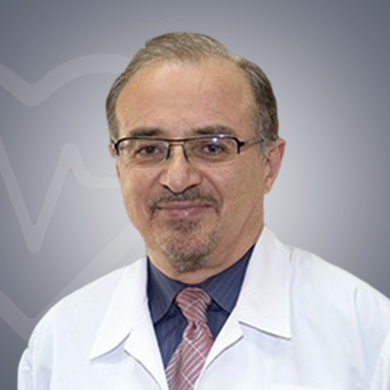
38 Years of experience
Speaks: English
Dr Seyed Hamid Sajjadi is a renowned ophthalmologist who has vast experience in various surgeries and can treat a number of conditions listed below:
Some of the most common eye conditions that the ophthalmologist treats are Diabetic Retinopathy, Dry eye Syndrome, and Conjunctivitis. The doctor might prescribe some antibiotics for bacterial conjunctivitis. Antibiotics might help lessen the length of infection. For dry eyes, the doctor will do physical examinations, and treatment may include use of artificial tears and reduce tear drainage.
Some of the signs and symptoms of different types of eye diseases are as follows:
Routine eye exams are the best way to avoid any vision problems. In case you did not have an eye exam for more than a year, you should schedule a visit with your eye doctor. Being aware of some warning signs can help you take the required steps for the health of your eyesight, especially if the vision symptoms appear suddenly. In most cases, detached retina and onset of glaucoma, quick intervention is required to minimize the permanent vision loss.
You can reach Dr Seyed Hamid Sajjadi from 10 am to 5 pm on Monday to Saturday. The average working hours of the doctor are 47 hours a week.
Ophthalmologist Seyed Hamid Sajjadi has performed a wide range of procedures. Some of the popular procedures performed by the doctor include:
LASIK (Laser in Situ Keratomileusis) uses a laser to reshape the cornea. This procedure uses a certain laser designed to treat vision issues, improve vision, and also reduce the need for glasses and contact lenses. The laser alters the shape of your cornea.

Share Your Experience about Dr. Seyed Hamid Sajjadi

An ophthalmologist helps improve patients’ vision by testing the eyes in order to diagnose and treat disorders. Some ophthalmologists specialize in eye surgery to correct and fix eye problems. An ophthalmologist can provide the same services as an optometrist, such as prescribing eyeglasses as well as contact lenses to treat vision problems. If you have an eye problem such as cataracts or any other conditions that would require surgical treatment, an ophthalmologist is a suitable doctor to address your problem. Though an ophthalmologist generally treats eye-related problems, they may also offer consultation for conditions that are not linked to the eyes. They also take part in scientific research to find new treatment methods.
An opthalmologist may suggest the below-listed tests for the diagnosis of eye conditions:
An opthalmologist may perform a number of different tests to evaluate your vision and diseases. Each test will evaluate some specific aspect of vision. The doctor may direct a beam of light in your eyes to look for any abnormalities in the retina. They design the treatment plan posts after evaluating the test reports.
An individual needs to consult an opthalmologist in case of the below situations:
The above signs and symptoms should not be ignored and must be discussed with an eye specialist because the diagnosis of eye condition at an early stage will help the doctor to plan effective treatment, They may also discuss your symptoms with other doctors to determine the right treatment.